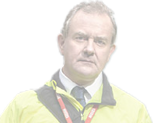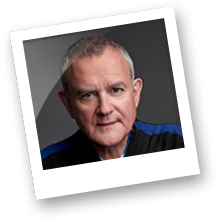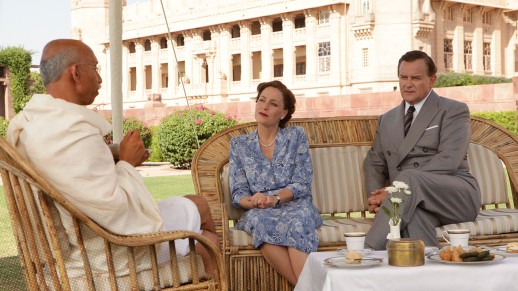Interview by Elysa Gardner for ET Online
Hugh Bonneville is aware that the aristocratic character he plays in the new film Viceroy’s House (in theaters and available on demand Sept. 1) could invite comparisons to the one he portrayed for six seasons on Downton Abbey. In the movie, Bonneville is once again cast as “a patriarchal figure running a big house, sometimes with disastrous results,” he tells ET, joking: “Listen, the truth is I’m a very limited actor. I keep giving the same performance.”
Laughs aside, there are notable differences between Downton’s Robert Crawley, Earl of Grantham, and House’s Lord Mountbatten (also an earl, of Burma) — the most obvious being that Mountbatten isn’t fictional. A great-uncle and mentor to Prince Charles, he was an accomplished naval officer and statesman whose numerous titles included viceroy of India. Mountbatten was the last person to hold that position, in 1947, the year in which House is set; he governed until India’s transition to independence and the tortured partition that accompanied it, creating the separate republic of Pakistan.
Director Gurinder Chadha, known for Bend It Like Beckham, has a personal connection to these events: Her Indian grandparents lived through the bloody conflict between the country’s Hindu and Sikh majority and the Muslim minority that sought a homeland in Pakistan. Though House reflects on how British imperial rule informed those tensions, Chadha writes in the film’s production notes that she and her co-writers “depicted a Mountbatten who was not the Machiavellian architect of Partition but a man caught up unwittingly in a bigger political game.”
Growing up in the U.K., Bonneville saw Mountbatten as “a huge figure in the royal family. He very much engineered the relationship between Prince Philip and Princess Elizabeth,” the future queen, Bonneville points out. “There were many contradictions in Mountbatten. He was not a diplomat; he was a man of action, and some thought a man of rash action.” As the film demonstrates, he and Lady Mountbatten (played in the film by Gillian Anderson), while glamorous, “were not snobs. They wanted to serve their country and to serve the best interests of India. They didn’t retreat into some castle or go back to England immediately; they worked tirelessly.”
At the same time, the last viceroy “was incredibly vain and loved pomp,” Bonneville notes. When he met Mountbatten’s younger daughter, Lady Pamela Hicks (played as a young woman by Lily Travers), Bonneville recalls telling her, “Your father looked like a film star; I’m afraid I don’t.”
Modesty notwithstanding, Bonneville’s already extensive list of movie credits continues to grow, with Paddington 2 in post-production (he’ll reprise his role as Henry Brown) and Breathe, directed by Andy Serkis, premiering at the Toronto International Film Festival. “I have a small part in that,” Bonneville says of the latter, which marks the longtime motion capture actor’s directorial debut. “It’s a beautiful, true story of a man who was affected by polio, played by Andrew Garfield, a remarkable actor. I leaped at the chance to work with him, and with Andy.”
Bonneville is also slated to portray celebrated author Roald Dahl in an upcoming biopic looking at “a telling period” in Dahl’s marriage to actress Patricia Neal. For the actor, the author was also “a man of contradictions: demanding, difficult, charismatic and with an enviable ability to captivate millions.”
For the millions of Downton fans, of course, a burning question remains: whether and when that TV phenomenon will translate to the big screen. Bonneville still can’t (or won’t) say much: “I’ve yet to see a shooting script. You guys always seem to know more about it than any of us in the cast do.” He allows, “We’re all still friends, and I look back on Downton with enormous affection. I do think there’s a lot of good will towards the notion of doing a movie, and it would be nice to think we could give it one last hurrah.”
The principal challenge, Bonneville says, “would be herding all us cast members together again, because we’re now all in different parts of the world. It could be a logistical nightmare. But never say never.”
At the moment, “I’m enjoying semi-retirement, staring at my garden,” Bonneville insists, despite showing no signs of slowing down. “My roots are firmly in the glorious county of West Sussex. I suppose I’m getting lazier in my old age.”
But don’t expect him to truly disengage any time soon. “I just look for characters and stories that are entertaining and quirky to fill the gap between now and the grave,” Bonneville says. “That’s what keeps me going.”









